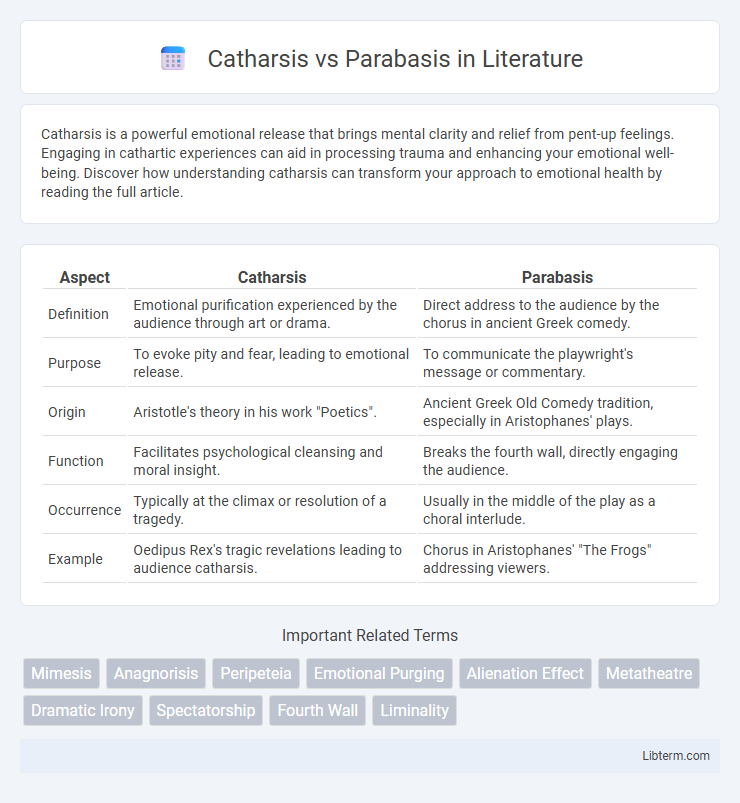Catharsis is a powerful emotional release that brings mental clarity and relief from pent-up feelings. Engaging in cathartic experiences can aid in processing trauma and enhancing your emotional well-being. Discover how understanding catharsis can transform your approach to emotional health by reading the full article.
Table of Comparison
| Aspect | Catharsis | Parabasis |
|---|---|---|
| Definition | Emotional purification experienced by the audience through art or drama. | Direct address to the audience by the chorus in ancient Greek comedy. |
| Purpose | To evoke pity and fear, leading to emotional release. | To communicate the playwright's message or commentary. |
| Origin | Aristotle's theory in his work "Poetics". | Ancient Greek Old Comedy tradition, especially in Aristophanes' plays. |
| Function | Facilitates psychological cleansing and moral insight. | Breaks the fourth wall, directly engaging the audience. |
| Occurrence | Typically at the climax or resolution of a tragedy. | Usually in the middle of the play as a choral interlude. |
| Example | Oedipus Rex's tragic revelations leading to audience catharsis. | Chorus in Aristophanes' "The Frogs" addressing viewers. |
Understanding Catharsis: Definition and Origins
Catharsis, rooted in Aristotelian poetics, refers to the emotional purification or purgation experienced by an audience through art, especially tragedy, leading to a sense of renewal and emotional clarity. This concept originates from Aristotle's "Poetics," where catharsis is described as the release of pity and fear that restores psychological balance. Understanding catharsis involves exploring its psychological and philosophical implications, highlighting its role in emotional transformation within theatrical and literary contexts.
Parabasis Explained: Historical Context and Meaning
Parabasis refers to a choral ode in ancient Greek comedy where the chorus directly addresses the audience, often expressing the playwright's views on politics, society, or theatrical matters. Historically, parabasis emerged prominently in Old Comedy, particularly in the works of Aristophanes during the 5th century BCE, serving as a bridge between dramatic action and social commentary. This formal interruption allowed the playwright to step outside the narrative to reveal philosophical insights or critique contemporary events, distinguishing it from catharsis, which involves the emotional purification experienced by the audience through tragedy.
Key Differences Between Catharsis and Parabasis
Catharsis refers to the emotional release or purification experienced by the audience through characters' intense feelings or tragic events, primarily in classical Greek tragedy. Parabasis, contrastingly, is a direct address by the chorus to the audience in Old Comedy, breaking the narrative flow to comment on social or political issues. The key difference lies in catharsis being an emotional and psychological process within the plot, whereas parabasis functions as a deliberate rhetorical intervention outside the story.
Literary Functions of Catharsis in Drama
Catharsis in drama operates as a powerful literary device that purges the audience's emotions, particularly pity and fear, leading to psychological relief and moral renewal. It plays a crucial role in Greek tragedy by allowing viewers to experience intense emotional release through the protagonist's suffering and resolution. This emotional cleansing facilitates a deeper understanding of human nature and ethical complexities, fostering empathy and introspection in the audience.
The Role of Parabasis in Greek Comedy
Parabasis in Greek comedy serves as a key moment when the chorus directly addresses the audience, often breaking the narrative to comment on political or social issues, theatrical conventions, or the playwright's views. This distinct structural device contrasts with catharsis, which involves emotional purification experienced by the audience through the plot's resolution. Parabasis plays a vital role in shaping audience engagement by blending humor with direct discourse, enriching the comedic experience beyond mere storytelling.
Emotional Impact: Catharsis vs Parabasis
Catharsis delivers a profound emotional release by guiding audiences through intense feelings of pity and fear, leading to psychological cleansing and renewed clarity. Parabasis, often breaking the narrative flow in classical Greek comedy, directly addresses the audience with commentary or satire, creating an intellectual or humorous impact rather than emotional purification. While Catharsis aims at emotional transformation, Parabasis engages viewers through self-awareness and reflection on social or political themes.
Catharsis in Modern Storytelling
Catharsis in modern storytelling functions as an emotional release where audiences experience profound relief and transformation after tension builds through conflict or tragedy. Unlike parabasis, which directly addresses the audience to convey the playwright's perspective, catharsis is achieved through the narrative arc and character development, culminating in a resolution that evokes empathy and psychological cleansing. Contemporary films and literature leverage catharsis to deepen emotional engagement, making stories resonate more powerfully by resolving inner and external conflicts.
Parabasis in Contemporary Theater
Parabasis, a theatrical device originating from ancient Greek comedy, involves the chorus directly addressing the audience to convey the playwright's views, breaking traditional narrative boundaries. In contemporary theater, parabasis functions as a metafictional tool, allowing creators to challenge audience perceptions, highlight thematic complexities, and blur lines between fiction and reality. This technique enhances audience engagement by fostering critical reflection on the performance's underlying messages and societal critiques.
When to Use Catharsis or Parabasis in Writing
Catharsis is most effective in writing when the goal is to evoke strong emotional release and provide resolution to characters' psychological conflicts, often seen in tragedies or intense dramas. Parabasis is ideal for breaking the fourth wall, allowing the author or chorus to directly address the audience and comment on the narrative or societal issues, commonly used in ancient Greek comedy and satirical works. Writers should use catharsis to deepen emotional engagement and use parabasis to inject commentary or humor without advancing the plot.
Catharsis and Parabasis: Influence on Audience Reception
Catharsis evokes a profound emotional release in the audience, allowing them to purge feelings of pity and fear through the unfolding tragedy, thereby fostering empathy and personal reflection. Parabasis interrupts the narrative flow with direct authorial commentary or societal critique, engaging viewers intellectually and prompting critical awareness rather than emotional immersion. Together, catharsis and parabasis shape audience reception by balancing emotional impact with conscious contemplation, influencing lasting interpretation and response to the performance.
Catharsis Infographic

 libterm.com
libterm.com